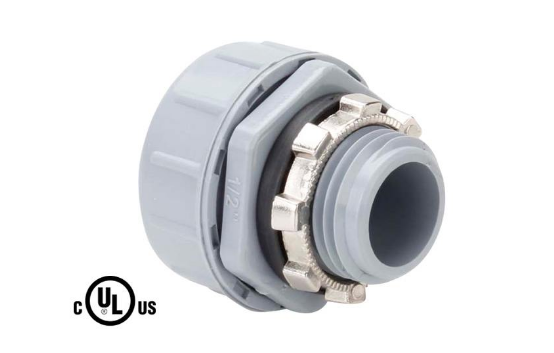Sep. 25, 2023
Flexible PVC conduit fittings are essential components in electrical systems, providing versatility and ease of installation for routing and protecting electrical wires. These fittings are designed to work seamlessly with flexible PVC conduit, making them a valuable choice for various applications, from residential to industrial. In this comprehensive guide, we will explore everything you need to know about flexible PVC conduit fittings, including their types, uses, installation, and advantages.
Types of Flexible PVC Conduit Fittings
Flexible PVC conduit fittings come in various types, each serving a specific purpose in electrical installations. Here are some common types:
1. Straight Connectors
Straight connectors are used to join two lengths of flexible PVC conduit in a straight line. They provide a secure and smooth connection, ensuring a continuous conduit pathway.
2. 90-Degree Elbows
90-degree elbows allow for changes in direction within the conduit system. They are used when routing conduit around corners or obstacles, providing a clean and organized turn.
3. 45-Degree Elbows
Similar to 90-degree elbows, 45-degree elbows offer a gentler change in direction. They are used when a conduit system requires a more gradual turn or bend.
4. Liquid-Tight Connectors
Liquid-tight connectors provide a watertight seal when joining flexible PVC conduit to electrical boxes or enclosures. They are commonly used in outdoor or damp environments to prevent moisture ingress.
5. T-Fittings
T-fittings allow for branching or tapping off from the main conduit path. They provide a connection point for additional conduit or electrical devices, such as outlets or switches.
6. Couplings
Couplings are used to join two sections of flexible PVC conduit together. They maintain the integrity of the conduit while allowing for easy disconnection when necessary.
7. Adapters and Reducers
Adapters and reducers enable transitions between different conduit sizes or types. They are useful when connecting flexible PVC conduit to other conduit materials or components.

Liquid Tight Non-Metallic Flexible Conduit Fitting - P50 Series(UL514B)
Applications of Flexible PVC Conduit Fittings
Flexible PVC conduit fittings are versatile and suitable for various electrical installations, including:
1. Residential Wiring
In homes, flexible PVC conduit and fittings are used for routing electrical wires within walls, ceilings, and floors. They provide protection and organization for wiring systems while allowing for flexibility in routing.
2. Commercial and Industrial Wiring
In commercial and industrial settings, flexible PVC conduit and fittings are used to manage electrical wiring in conduits, cable trays, or exposed installations. They offer protection against mechanical damage and environmental factors.
3. Outdoor and Underground Installations
Flexible PVC conduit fittings are commonly employed in outdoor and underground installations due to their resistance to moisture and corrosion. They protect electrical wires from environmental elements and soil contact.
4. Tight Spaces and Complex Routing
The flexibility of PVC conduit and fittings makes them ideal for installations in tight spaces or areas requiring complex routing, such as around structural components or machinery.
Advantages of Flexible PVC Conduit Fittings
Flexible PVC conduit fittings offer several advantages that make them a preferred choice in electrical installations:
1. Flexibility
The primary benefit of flexible PVC conduit fittings is their flexibility. They can easily bend and adapt to various installation scenarios, simplifying routing through tight spaces and complex configurations.
2. Corrosion Resistance
Flexible PVC conduit and fittings are highly resistant to corrosion, making them suitable for outdoor and damp environments. They do not deteriorate when exposed to moisture or chemicals.
3. Ease of Installation
Installing flexible PVC conduit fittings is straightforward, and they can be easily cut and assembled using basic tools. This ease of installation reduces labor time and costs.
4. Lightweight
Flexible PVC conduit and fittings are lightweight, making them easy to handle and transport. This characteristic is particularly advantageous when working in elevated or confined spaces.
5. Electrical Insulation
PVC is a non-conductive material, meaning it does not conduct electricity. This property ensures the safety of electrical installations by reducing the risk of electrical shock or interference.
Installation and Safety Considerations
When working with flexible PVC conduit fittings, follow these installation and safety considerations:
1. Compliance with Codes and Regulations
Ensure that your flexible PVC conduit installation adheres to local electrical codes and regulations. Compliance is essential for safety and code compliance.
2. Proper Bending
When bending flexible PVC conduit, use bending tools designed for the purpose to prevent kinks and damage to the conduit. Avoid sharp bends that could restrict wire movement.
3. Avoid Excessive Heat
Flexible PVC conduit and fittings can soften and deform when exposed to excessive heat. Keep them away from heat sources and areas with high temperatures.
4. Secure Attachments
Properly secure flexible PVC conduit and fittings to prevent movement or disconnection, especially in areas prone to vibration or physical contact.
5. Inspection and Maintenance
Regularly inspect flexible PVC conduit systems for signs of damage, wear and tear, or deterioration. Replace any damaged components promptly to maintain electrical safety.
Conclusion
Flexible PVC conduit fittings play a crucial role in electrical systems, offering flexibility, durability, and ease of installation. Their versatility makes them suitable for various applications, from residential to industrial settings. When used correctly and in compliance with electrical codes, flexible PVC conduit fittings provide a safe and reliable solution for routing and protecting electrical wires while ensuring the integrity of the conduit system.

















